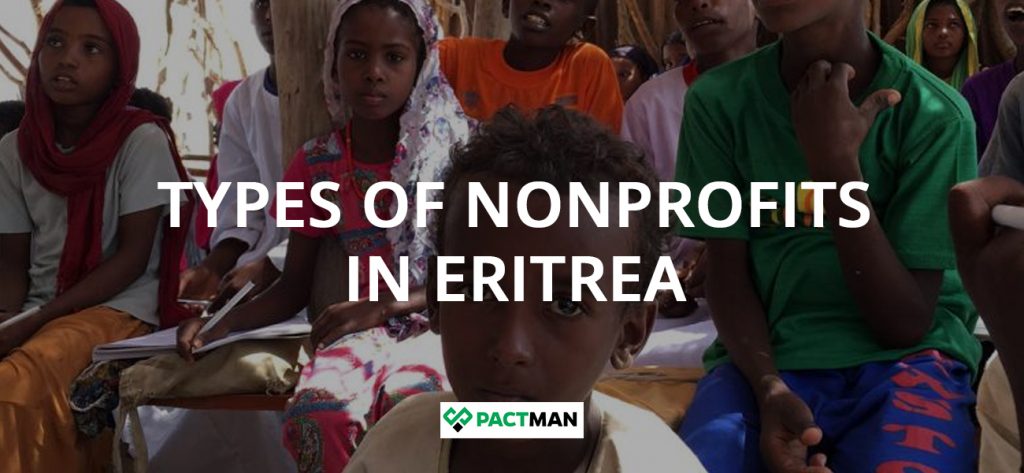Eritrea, like most developing nations, continues to confront the challenges of good governance. This in turn has hindered the effectiveness of the various types of nonprofits in the country. Barely little can be done by civil organizations when a nation lacks favorable policies to enable them to thrive.
Eritrea believes and continues to insist on the principle of self-reliance as a nation. Consequently, this has weakened the country and has resulted in the absence of essential services. The government on the other hand has been unable to address the critical issues being faced by its citizens.
In this article, we will discuss the types of nonprofits in Eritrea and their activities in the nation.

- The Eritrean government in May 2005 issued a proclamation outlawing all domestic and foreign NGOs from accepting funds for rehabilitation work
- The country is included among the least developed nations in the UNDP’s Human Development Index
- The United Nations also ranks Eritrea among the world’s largest countries of origin for refugees
What are the types of nonprofits in Eritrea?
Eritrea’s NGO Proclamation recognizes the activities of three types of nonprofits. They are;
1. Nongovernmental Organizations (NGOs):
These organizations can also be considered national nonprofits. NGOs are established to serve the needs of the public. These entities also advocate for the well-being of the citizens and are independent of government influence. However, they may receive funding from the government. Also, non-governmental organizations largely obtain funding from private sources.
2. Local Nongovernmental Organization:
These types of nonprofits are formed to provide services to society or community, especially in the area of humanitarian aid. They also function like community-based groups. Local NGOs are known as grassroots organizations. Their programs and activities tend to address immediate issues facing their surrounding environment. They are close to the people. As a result, they understand the needs of the society in which they operate.
3. International Nongovernmental organization:
These types of nonprofits operate in multiple countries. Corporations such as this are not a part of any government entity. Likewise, they have no ties to the government, nor are they influenced by any government dealings.
International NGOs are known to solve global problems such as poverty, inequality, hunger, and oppression, among others. They sometimes carry out their duties by collaborating with local aid groups as well as international allies. Their resource capacity enables them to tackle enormous problems that cannot be independently handled by domestic NGOs.
How has the Eritrean regulatory framework hindered the growth of nonprofits?
The Eritrean government in May 2005 issued a proclamation outlawing all domestic and foreign NGOs from accepting funds for rehabilitation work. This prohibition extends to the United Nations, as well as its affiliates and other global corporations.
Likewise, NGOs can only operate if they have at their disposal $1 million or its equivalent when converted. It should be noted that Eritrea is an extremely poor nation with a meager domestic sum assigned to civil society. The country is included among the least developed nations in the UNDP’s Human Development Index. Even so, it ranks 180 out of 189 with a GDP per capita of barely $800.38.
Ten months following the proclamation, there was a drastic fall in the number of NGOs operating in the country by more than half. Also, the prohibition of foreign funding further resulted in a weakened sector. The reports given by the U.S. Department of State revealed that Eritrea had only 16 registered NGOs operating in the country between 2006 and 2007.
The recurring rights crisis in the nation has also pushed thousands of citizens into exile. Several children and youth have fled to escape conscription. It was reported that 9346 Eritreans escaped in early 2020. A third of the numbers were said to be children. This is excluding the hundreds of thousands of citizens that have escaped the country in previous years. The United Nations ranks Eritrea among the world’s largest countries of origin for refugees.
The few international nonprofits operating in the country function in a tight space with strict government supervision. The Eritrean government believes in the concept of self-reliance. Hence, the idea of foreign aid as a requirement for development is rather disregarded in the country.
Conclusion
The impact of the various types of nonprofits in Eritrea can hardly be measured in a system that largely limits their operation. Hence, the nation’s government is considered one of the most repressive in the world. The many restrictions such as freedom of expression, faith, and opinion have created a handicapped system.
Also, the government’s perpetual resistance to independent scrutiny by international monitors has worsened the nation’s plight.
When there is an absence of nonprofits in a nation, government responses can hardly meet the needs of marginalized communities. At the present, Eritrea urgently requires intense and radical changes at the national, regional, and international levels. This is needed if the nation will ever experience sustainable development and economic growth.
If you enjoyed reading this article, please share your comments or questions with us at the bottom of the post.


